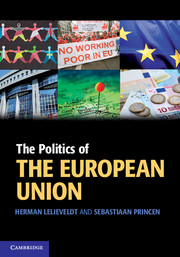Book contents
- Frontmatter
- Contents
- Acknowledgements
- List of briefings
- List of fact files
- List of controversies
- List of tables
- List of figures
- List of abbreviations and acronyms
- List of country abbreviations used in tables and figures
- Preface
- PART I Setting the scene: origins, analytical perspectives and institutions
- PART II Key actors in EU politics: citizens, interest groups and political parties
- 5 Public opinion and political participation
- 6 Interest groups and interest representation
- 7 Political parties and the European Parliament
- Part III EU policies: agenda-setting, decision-making and implementation
- Conclusions and reflections
- Key terms and concepts
- Index
6 - Interest groups and interest representation
from PART II - Key actors in EU politics: citizens, interest groups and political parties
- Frontmatter
- Contents
- Acknowledgements
- List of briefings
- List of fact files
- List of controversies
- List of tables
- List of figures
- List of abbreviations and acronyms
- List of country abbreviations used in tables and figures
- Preface
- PART I Setting the scene: origins, analytical perspectives and institutions
- PART II Key actors in EU politics: citizens, interest groups and political parties
- 5 Public opinion and political participation
- 6 Interest groups and interest representation
- 7 Political parties and the European Parliament
- Part III EU policies: agenda-setting, decision-making and implementation
- Conclusions and reflections
- Key terms and concepts
- Index
Summary
Introduction
In January 2004, the European Commission released its proposal for a Services Directive. The Directive sought to make it easier to provide services in another EU member state. It primarily did so by introducing the ‘country of origin’ principle, which meant that firms and individuals would be able to provide services in any other EU member state under the rules and regulations of the member state in which they were established.
Somewhat to the surprise of the Commission, the proposal evoked massive opposition from various sides. Trade unions feared that the Directive would lead to ‘social dumping’, for instance when plumbers from Poland worked in France under Polish labour regulations – including (much lower) Polish wages. The Polish plumber became an iconic figure in the debate when the Commissioner responsible for the proposed Directive, Frits Bolkestein, said he would love to hire a Polish plumber to work in his French holiday home. In response, French plumbers cut off his water supply. Another bone of contention was the inclusion of public services in the proposed Directive. The Directive, including its country of origin principle, would not just apply to plumbers and other commercial service providers but also to sectors such as health care and public transport. In that way, it would contribute to the liberalization of sectors that were strictly regulated in most member states.
- Type
- Chapter
- Information
- The Politics of the European Union , pp. 128 - 150Publisher: Cambridge University PressPrint publication year: 2011



